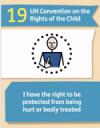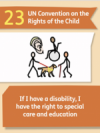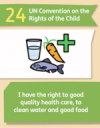Flintshire County Council Policy – Intimate Care in the School Setting
FAQ’s
What is Intimate Care?
Intimate care is defined as ‘any care which involves washing, touching or carrying out an invasive procedure that most children and young people carry out for themselves, but which some are unable to do’. Examples include support with dressing and undressing (underwear), changing incontinence pads and nappies, helping someone use the toilet or washing intimate parts of the body.
Can a parent or carer be contacted in order to change their child if they have wet or soiled themselves at school?
It is not generally acceptable practice to ask parents to come into school to change their child after they have wet or soiled themselves. It is considered abuse to force/allow a child to sit in wet or soiled underwear until their parent or guardian can come in to change them.
Do two members of staff need to be present to change a child?
There is no legal requirement for two members of staff to be present. For safeguarding reasons, staff who help with intimate care should make sure another member of staff is aware they are going to change a child and is in the vicinity and visible or audible. Intimate care procedures should not involve more than one member of staff unless the pupil’s individual healthcare plan specifies the reason for this e.g. manual handling.
Is it ok that an adult will have to leave the classroom to change a child?
Yes. Changing a child is unlikely to take more than ten minutes (approx); not dissimilar to the amount of time that might be allocated to work with a child on an individual learning target. The time spent changing the child can be a positive and learning time. If a child needs changing on a regular basis, then preparing a care plan will clarify whether additional adult support, above that usually provided in the classroom, will be necessary to meet an individual pupil’s needs.
Can staff members of the opposite sex be involved in Intimate Care procedures?
Yes. There is a positive value in both male and female staff being involved in intimate care tasks. All designated staff, of whatever gender, should be DBS checked and given training in good practice. Male staff will not usually be involved in the intimate care of girls. Where cultural or family reasons make a carer of the opposite sex unacceptable, this must be respected.
What happens if a member of staff refuses to change a child who requires intimate care?
The Equality Act 2010 is clear that children should be protected from discrimination and so a child who has soiled should be changed and enabled to return to the classroom as soon as possible to resume learning. The issue should not arise if designated support staff have been advised on appointment and induction and existing support staff trained in relation to the school’s duties under the Equality Act 2010.
Who provides nappies for children who require Intimate Care?
Parents are responsible for the provision of nappies. Families will usually receive nappies from the Continence Service who may ask school how many nappies they require in order to calculate how many to supply to parents.
What if the school have no facilities to change children?
If your school has no accessible toilet with a changing bed then it may be necessary to change the child in an alternative private and hygienic area. This should be a temporary arrangement (reasonable adjustment) and you should contact Stephanie Aldridge on 01352 702131 or email stephanie.aldridge@flinthsire.gov.uk to discuss provision of suitable facilities. There may be financial support towards building works for disabled pupils. All schools should be planning to improve access for disabled pupils in their Accessibility Plan.
How should the school dispose of nappies of children who require Intimate Care?
Nappies can be disposed of with normal waste unless there are very large quantities involved. Wet nappies and soiled nappies should be double bagged.
Why does a child continue to soil themselves?
Medication to resolve constipation difficulties will often result in leakage. The medication can take some time to resolve problems and the child may need more frequent care during this time. Health professionals involved with the child’s treatment will be able to advise.
What should I do if a child seems upset or anxious about their Intimate care?
If it is new or changed behaviour then it is important to ask the family whether anything has happened that may have led to the change. If you remain concerned you should follow normal Child Protection Procedures.
What measures should be taken to avoid the child requiring Intimate Care being teased?
Changing a child promptly and discretely will minimise the attention drawn to them. Reasonable adjustments might include allowing privacy when changing for PE, appropriate clothing to avoid drawing attention to a nappy and systems for leaving class without fuss. The school should consider how it celebrates difference and promotes positive attitudes towards disabled people or those with healthcare needs.
References:




